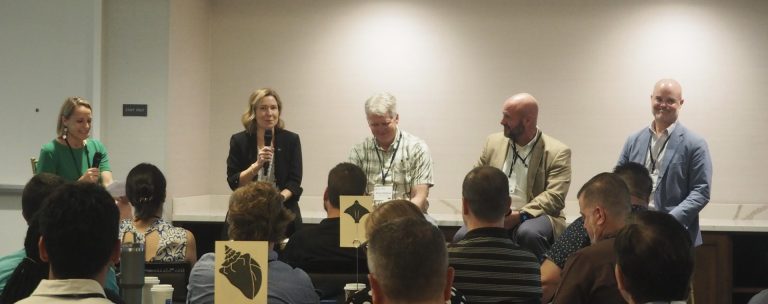The power of positive interactions in nature and networks
A year ago, our center volunteered to host the first Network for Engineering With Nature (N-EWN) 2024 Partner Symposium here in the Sunshine State. Last week, we welcomed 170 participants to St. Augustine from around the country for two-days of productive exchanges around nature-based solutions (NBS), a field that is rapidly gaining prominence nationwide, and has been an integral part of the mission of the Center for Coastal Solutions from the beginning.
We were elated at the turnout and even more so by the collaborative spirit of those who came. A co-founder of N-EWN summed it up succinctly in a panel that I moderated on the network’s successful evolution: “One of the reasons I think we have so much momentum going on right now is because of the nature of our organizations,” said Todd Bridges, Professor of Practice, Resilient and Sustainable Systems, College of Engineering at the University of Georgia (UGA). “Organizations are making the intentional choice to cooperate and collaborate and not compete. This is an open fellowship.”

It’s a fellowship that’s having a positive impact in an area near and dear to the CCS: education. Over two-days, we heard about several new certificate and graduate courses in NBS that are being developed by academic institutions in response to the growing need in industry for expertise, including here at the University of Florida’s Engineering School of Sustainable Infrastructure & Environment and Oklahoma University’s Center for Restoration of Ecosystems and Watersheds (CREW).
“We’re seeing a certain convergence with graduate education in nature-based solutions and growing connections with industry,” noted Brian Bledsoe, founding director of the Institute for Resilient Infrastructure Systems at UGA and co-founder of N-EWN. “We’re starting to get this feedback loop from industry of what they need … interdisciplinary problem solving, systems thinking. We’re closer to a place where we have a critical mass of programs across the country.”
The intentional focus on positive interactions and cooperation among the network’s 28 partners is reflective of how natural systems work: While there is competition, ultimately, all parts of the system are interconnected, and cooperation is vital for adaptation and survival. The whole – academia, industry, government, non-governmental organizations and civil society – can accelerate the adoption of NBS and the integration of natural features or processes with the built environment in resilience projects much faster than any one player. The future resilience of communities, economies and the environment in a rapidly changing world depends on it.
To the N-EWN fellowship!
